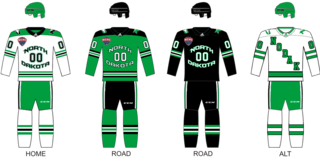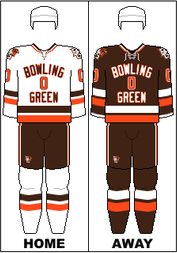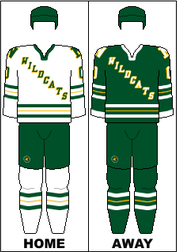Related Research Articles

The North Dakota Fighting Hawks men's ice hockey team is the college ice hockey team of the University of North Dakota. They are members of the National Collegiate Hockey Conference (NCHC) and compete in National Collegiate Athletic Association (NCAA) Division I ice hockey. North Dakota is widely regarded as a premier college hockey school and has one of the most storied programs in NCAA history. UND has made over 30 appearances in the NCAA tournament, appeared in the Frozen Four 22 times, and has won 8 NCAA Division I Championships. The program has also achieved 15 WCHA Regular Season Championships, 6 NCHC Regular Season Championships, and 12 Conference Tournament Championships. The school's former nickname was the Fighting Sioux, which held a lengthy and controversial tenure before being retired in 2012 due to pressure from the NCAA. The official school nickname is now the Fighting Hawks, a name that was chosen by the university on November 18, 2015.

The Denver Pioneers men's ice hockey team is a National Collegiate Athletic Association (NCAA) Division I college ice hockey program that represents the University of Denver. They play at Magness Arena in Denver, Colorado. The Pioneers are a member of the National Collegiate Hockey Conference (NCHC). Previously, they were members of the Western Collegiate Hockey Association (WCHA), from its creation in 1959 until 2013.

The Bowling Green Falcons ice hockey team is the ice hockey team that represents Bowling Green State University in Bowling Green, Ohio. The school's team competes in the Central Collegiate Hockey Association. The Falcons last played in the NCAA Men's Division I Ice Hockey Tournament in 2019. The Falcons have won one NCAA Division I championship, coming in 1984, defeating the Minnesota-Duluth Bulldogs in the longest championship game in the tournament's history.

The Lake Superior State Lakers men's ice hockey team is a National Collegiate Athletic Association (NCAA) Division I college ice hockey program that represents Lake Superior State University. The Lakers are a member of the Central Collegiate Hockey Association (CCHA). They play at the Taffy Abel Arena in Sault Ste. Marie, Michigan.

The Northern Michigan Wildcats men's ice hockey team is a National Collegiate Athletic Association (NCAA) Division I college ice hockey program that represents Northern Michigan University (NMU). The Wildcats are a member of the Central Collegiate Hockey Association (CCHA). NMU has won one national title and has made three Frozen Four appearances. They play at the Berry Events Center in Marquette, Michigan.

The Omaha Mavericks men's ice hockey team, also called the Nebraska Omaha Mavericks and UNO Mavericks, is a National Collegiate Athletic Association (NCAA) Division I college ice hockey program that represents the University of Nebraska Omaha. The Mavericks are a member of the National Collegiate Hockey Conference (NCHC). They play home games at Baxter Arena, an on-campus facility that opened in 2015. The Mavericks hockey program was started in 1997; the team has qualified for the NCAA tournament on four occasions, in 2006, 2011, 2015, and 2021. During the 2015 tournament, the team made their first appearance in the tournament semifinals, branded by the NCAA as the Frozen Four. The Mavericks competed in the Central Collegiate Hockey Association (CCHA) between 1999 and 2010 before joining the WCHA for the 2010–11 season. The Mavericks joined the National Collegiate Hockey Conference starting in the 2013–14 season along with fellow charter members Colorado College, the University of Denver, Miami University, the University of Minnesota Duluth, and the University of North Dakota, plus invited founding members St. Cloud State University and Western Michigan University.

The 1963–64 Michigan Wolverines men's ice hockey team represented the University of Michigan in college ice hockey. In its seventh year under head coach Al Renfrew, the team compiled a 24–4–1 record and outscored all opponents 217 to 80. The Wolverines advanced to the 1964 NCAA Division I Men's Ice Hockey Tournament. They defeated the Providence Friars in the first round of the Frozen Four and then defeated the Denver Pioneers by a 6–3 score in the national championship game in Denver, Colorado.

The 1954–55 Michigan Wolverines men's ice hockey team represented the University of Michigan in college ice hockey. In its 11th year under head coach Vic Heyliger, the team compiled an 18–5–1 record, outscored opponents 107 to 70, and won the 1955 NCAA men's ice hockey tournament. The 1955 championship was Michigan's fifth NCAA hockey championship in eight years.

The 1961–62 Michigan Tech Huskies men's ice hockey team represented Michigan Tech University in college ice hockey. In its 6th year under head coach John MacInnes the team compiled a 29–3–0 record and reached the NCAA tournament for the third time in its history. The Pioneers defeated Clarkson 7–1 in the championship game at the Utica Memorial Auditorium in Utica, New York.

The 1962–63 North Dakota Fighting Sioux men's ice hockey team represented the University of North Dakota in college ice hockey. In its 3rd year under head coach Barry Thorndycraft the team compiled a 22–7–3 record and reached the NCAA tournament for the third time. The Fighting Sioux defeated Denver 6–5 to win the championship game at the McHugh Forum in Chestnut Hill, Massachusetts.

The 1964–65 Michigan Tech Huskies men's ice hockey team represented Michigan Tech University in college ice hockey. In its 9th year under head coach John MacInnes the team compiled a 24–5–1 record and reached the NCAA tournament for the fourth time in its history. The Huskies defeated Boston College 8–2 in the championship game at the Meehan Auditorium in Providence, Rhode Island.
The 1965–66 Michigan State Spartans men's ice hockey team represented Michigan State University in college ice hockey. In its 15th year under head coach Amo Bessone the team compiled a 16–13–0 record and reached the NCAA tournament for the second time in its history. The Spartans defeated Clarkson 6–1 in the championship game at the Williams Arena in Minneapolis, Minnesota. As of 2018, the 1965–66 Michigan State team has the worst record of any national champion for Division I ice hockey.
The 1990–91 Northern Michigan Wildcats men's ice hockey team represented Northern Michigan University (NMU) in college ice hockey. In its 15th year under head coach Rick Comley, the team compiled a 38–5–4 record. The Wildcats won the 1991 national championship, their first national title.
James Haas is a Canadian retired ice hockey defenseman and forward who won consecutive National Championships with Michigan in the 1950s.
Alexander Douglas MacLellan was a Canadian ice hockey defenceman who won three consecutive national championships with Michigan.
Lorne Howes is a Canadian retired ice hockey goaltender who won back-to-back National Championships for Michigan in the 1950s.
Robert "Bob" Schiller is a Canadian retired ice hockey defenseman who won back-to-back National Championships for Michigan in the 1950s.
Robert Gray is a Canadian retired ice hockey goaltender who was the Most Outstanding Player of the 1964 NCAA Tournament.
Richard W. Best is a Canadian retired ice hockey goaltender who was an All-American for Michigan Tech.
William Pye is an American ice hockey coach and former goaltender who was an All-American for Northern Michigan and helped the team win its first National Championship in 1991.
References
- 1 2 "1967-1968 All-American Team". The American Hockey Coaches Association. Retrieved 2017-06-21.
- ↑ "Michigan Hockey Record Book" (PDF). Michigan Wolverines. Archived from the original (PDF) on July 15, 2022. Retrieved February 8, 2021.
- ↑ "Jim Keough". Dekers Club. Retrieved February 8, 2021.